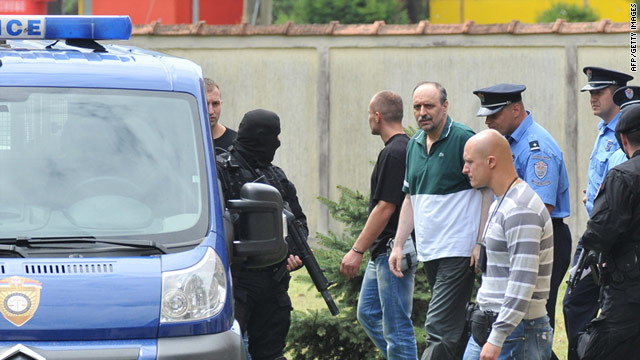By the CNN Wire Staff
July 22, 2011 -- Updated 1608 GMT (0008 HKT)

Police secure the area while Goran Hadzic (center) is taken to see his ailing mother ahead of his transfer to the Netherlands.
RELATED TOPICS
(CNN) -- Goran Hadzic -- the last Yugoslav war crimes suspect at large until his arrest this week -- arrived in the Netherlands on Friday and was detained by the International Criminal Tribunal for the former Yugoslavia, the tribunal said Friday.
An ex-Croatian Serb rebel leader who had been a fugitive for seven years, Hadzic was captured in Serbia on Wednesday. He was wanted for crimes against humanity and war crimes in connection with the wars that followed the break-up of Yugoslavia in the early 1990s.
The former president of a self-proclaimed Serbian republic in Croatia, Hadzic is accused of trying to remove Croats and other non-Serbs from the territory and the "extermination or murder of hundreds of Croat or other non-Serb civilians," among many other crimes, according to the International Criminal Tribunal for the former Yugoslavia.
He was the last fugitive of the 161 people indicted by the tribunal, which is based in The Hague.
Hadzic was admitted to a United Nations detention unit at The Hague on Friday, the International Criminal Tribunal for the former Yugoslavia said in a statement.
He is charged with a number of offenses committed in eastern Slavonia, Croatia, including persecution, murder, imprisonment, torture, cruel treatment and deportation, the tribunal said.
Prosecutors say he and others sought to permanently remove a majority of the Croat and non-Serb population from about a third of Croatia to make way for a Serb-dominated state.
Hadzic is charged in one incident in which 264 people were taken from a hospital in November 1991, detained and "beaten and tortured before being transported to a remote execution site ... where they were killed and buried in a mass grave," the tribunal statement on Friday said.
Other Croats and non-Serbs were held in "brutal" conditions "characterized by inhumane treatment, overcrowding, starvation, forced labour, inadequate medical care and constant physical and psychological assault, including mock executions, torture, beatings and sexual assault," according to an indictment the tribunal quoted in its statement.
War crimes suspect arrives in Netherlands for trial - CNN.com
